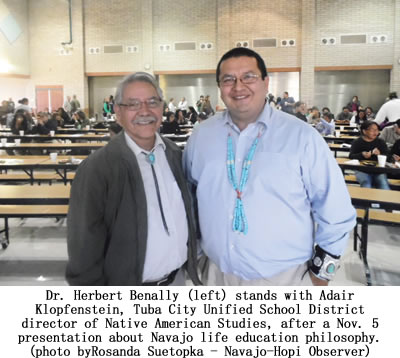 |
Canku Ota
|
 |
|
(Many Paths)
|
||
|
An Online Newsletter
Celebrating Native America
|
||
|
December 2014 - Volume
12 Number 12
January 2015 - Volume 13 Number 1 |
||
|
|
||
|
Tuba City School
District Continues Focus On Navajo And Hopi Values
|
||
|
by Rosanda Suetopka
- Navajo-Hopi Observer
|
||
|
In the next couple of months, a presentation for teachers and staff will take place on incorporating Hopi tribal values and lifeways into the daily curriculum and activities for the student population. The district is in its second year of incorporating Navajo and Hopi cultural values, language and lifeways. The district is taking tribal heritage and culture along with technology into the next century, building self-reliant, contributing, respectful student citizens of the world. Benally explained there are four directions and four main principles of T'aa'Dine' teachings including east, south, west and north directions and life tasks that go along with those sacred directions. The strength of T'aa'Dine' philosophy is a harmonious life and holistic view of life that strives for beauty, peace, harmony and joy in daily living. Understanding and practicing these directions gives strong foundation to all decisions for everyone. Benally's presentation startrf with the east direction. East also means Dawn, the Spring and Mt. Blanca means character development and excellence of the heart and mind. Dawn also means light and clarity, which helps make more thoughtful decisions. According to Benally, decisions made without this eastern direction can be greedy or socially unjust, which can lead to degradation and destruction. The south direction, means Blue Horizon, summer, Mt. Taylor and travel for a purpose. Benally said the south means to provide for oneself and maintain dignity and self-sufficiency through travel knowledge. To achieve this goal, one must work in all dimensions. That work has an ethical and social dimension and impact on one's environment. Work also has the added dimension of modernization and excessiveness which can be a concern in Navajo philosophy. To take anything in excess is harmful and evil. To ensure balance, one must not forget their environment and only take what will actually be used in one's life for a meaningful purpose. The west represents twilight or autumn, the San Francisco Peaks and family cohesiveness. Benally said the west represents positive human relationships. This type of relationship begins in the home, where kinship rather than names are generally used to address family members. The use of appropriate kinship names between siblings and family members strengthens positive family ties and connections. The use and acknowledgement of clan systems is also very important. How one reacts within their own home community, their cooperative attitude to help and assist and willingness to show respect all comes from this direction. The north, represents darkness, winter, La Plata Mountain and hope. Benally said this fourth area of knowledge represents self-fulfillment, respect and reverence. It also represents the interconnectedness and inter-dependence of all life. In the current time of pollution and toxic concerns, tribal people are aware of the inter-connectedness of all things on the planet to one another including animals, people, plants, landscape, water and air. They must be mindful of the balance that should be maintained for a healthy life and outlook. Benally told the teachers and staff that his presentation was to help them with their daily interaction with students. "To really listen to them, to be respectful to them, to hear them," Benally said, adding this type of tribal philosophy was "really the whole purpose of life skills education." Benally reminded the staff that the elders weren't lazy and used themselves as role models to help the kids or grandkids learn a daily positive work ethic. The elders also used kind words to encourage their young ones to learn. He also reminded everyone that daily prayer is extremely important to keeping a spiritual balance and to be flexible and that sometimes circumstances are difficult and you must work around them to learn. "Don't let the mattress beat you everyday," Benally said. "Remember to have discipline, get up early, go out and pray or go for a walk in the dawn and appreciate your life and your family and your surroundings. Start off each day with a purpose."
|
|
|
||
|
|
||
| Canku Ota is a free Newsletter celebrating Native America, its traditions and accomplishments . We do not provide subscriber or visitor names to anyone. Some articles presented in Canku Ota may contain copyright material. We have received appropriate permissions for republishing any articles. Material appearing here is distributed without profit or monetary gain to those who have expressed an interest. This is in accordance with Title 17 U.S.C. Section 107. | ||
|
Canku Ota is a copyright ©
2000 - 2014 of Vicki Williams Barry and Paul Barry.
|
||
 |
 |
|
|
The "Canku
Ota - A Newsletter Celebrating Native America" web site and
its design is the
|
||
|
Copyright ©
1999 - 2014 of Paul C. Barry.
|
||
|
All Rights Reserved.
|
||
 Tuba
City, AZ. - Philosophy professor Dr. Herbert Benally visited Tuba
City Unified School District Nov. 5 to share a presentation on the
Navajo T'aa'Dine' teaching philosophy, which incorporates daily,
clockwise four direction driven values and principles for teaching
young students how to become successful, productive, honest, inspired
and environmentally sensitive people.
Tuba
City, AZ. - Philosophy professor Dr. Herbert Benally visited Tuba
City Unified School District Nov. 5 to share a presentation on the
Navajo T'aa'Dine' teaching philosophy, which incorporates daily,
clockwise four direction driven values and principles for teaching
young students how to become successful, productive, honest, inspired
and environmentally sensitive people.